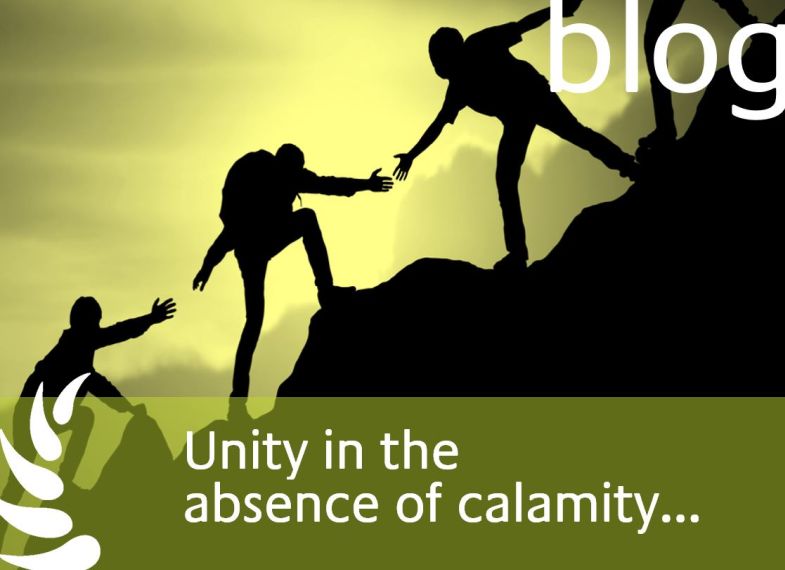Unity in the absence of calamity
By Chacko Jacob
The blogpost on 24.04.2020 talked about the incredible way in which all the pillars of society came together to deal with the current Corona crisis. Government bodies, non-profits, philanthropists, selfless citizens, corporations etc. joined hands to mitigate the enormous existential threat posed by the pandemic to vulnerable groups. Many NGOs set aside their regular work (mostly due to health regulations and lockdown) to support in relief work. One example was that of environmentalist Ragunath Veeravel (2019 graduate), founder of Aaranya, who provided food for tribal people and migrant workers who were struggling to make ends meet. His story is one of many among our alumni.
Gouri Sankar, founder of an-anya, an organisation who works for marginalized children, Sadhana Nayak who founded Sadhan, works on livelihood training for marginalized women, Jyotshna Das, founder of Janamangal supported an alcohol ban during lockdown to reduce incidences of domestic violence, Samuel Odwar, founder of Thumbs up academy who supports disabled children in Gulu, Uganda.
Omona Innocent, founder of Lighta supports aids orphans in Uganda, Miatta, founder of LEEMAH who empowers ex-sexworkers in Liberia and Ruang, founder of Hinghoy Noi who works for marginalized children and youth in Thailand. Till date, all of them and many other kantharis were able to, and continue to make use of the kanthari emergency fund, funded by generous readers who became supporters such as yourself, to support 6000+ individuals all over the world. On behalf of all THANK YOU for your support!
We agree that during crises, we all do band together: NGOs, governments, and citizens alike. We do what needs to be done. But what about ‘normal times’ when there isn’t a raging pandemic or any natural calamity? Is everything fine and dandy? Do we not need NGOs, non-profits or volunteer organizations anymore? One argument can be made that ‘normal times’ don’t ever exist. There are always crises going on, only that they happen more among the sections of society that are easily overlooked. People whose rights are being disregarded, their lives disvalued, and who face a barrier to every opportunity that some of us do not have to think about twice.
Every kanthari stands FOR something. That something could be:
– equal access to education for children of prisoners (Raja, GNE),
– Access to creative learning spaces for children in rural areas (Abhijit, Project DEFY),
– prevention of suicide among youths in India (Sherin, Let’s Live),
– a life of dignity for the aged homeless in Pondicherry (Anumuthu, Snehan),
equal access to opportunity for Dalit children (Bharath, Mudita)… the list goes on.
Changemakers pursue the betterment of lives of the marginalized, prevention and mitigation of suffering, and conservation of the environment we all share.
The much talked about ‘ease of doing business index’ ranks countries based on several subindices that indicate clarity of regulations, protection of property rights, access to credit etc. I wonder what such a ranking would look like if it were made for the social sector. How easy is it for a non-profit in their home country to focus completely on their mission rather than jumping through hoops around complex regulations regarding initiation, funding, and day to day operations?
The social sector might not be perfect, yes, there are surely cases of corruption, abuse of power, and ill motives. But every true social changemaker would agree to comply to accountability regulations and monitoring. What does not help are regulations that hurt non-profits who are doing good, honest work that is essential to their beneficiaries.
Again, we all stand FOR positive change: towards a more equal, inclusive, and solidaric society. This is work that is not self-serving or profit driven. It should not be limited, but instead opportunities for collaboration should be sought by governments worldwide.
Most of the times we desire the same goals and are willing to work hard to realize them; and the way we handle disagreements shows the health of a nation’s democracy. Neither the government nor the social sector should be guided by fear and distrust. This would only serve as a barrier to positive change. Since both sectors exist for the betterment of society, they need to identify their own limitations, and reach out to the other, so together the positive impact can be maximized.

